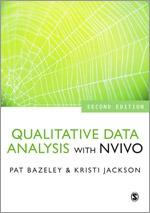Qualitative Data Analysis: With NVIVO
Welcome to the companion website!
Welcome to the companion website for Qualitative Data Analysis, 2nd Edition, by Patricia Bazeley and Kristi Jackson. The resources on the site have been specifically designed to support your study.
Instructors can log in to access:
- Sample Projects
- Additional Guidelines
- References
- QSR International website and forums
About the book:
Lecturers/instructors only - request a free digital inspection copy here
This straightforward, jargon-free book provides an invaluable introduction to planning and conducting qualitative data analysis with NVivo. Written by leading authorities, with over 40 years combined experience in computer-assisted analysis of qualitative and mixed-mode data, the new edition of this best selling textbook is an ideal mix of practical instruction, methodology and real world examples.
Practical, clear and focused the book effectively shows how NVivo software can accommodate and assist analysis across a wide range of research questions, data types, perspectives and methodologies. It sets out:
- The power and flexibility of the NVivo software
- How best to use NVivo at each stage in your research project
- Examples from the authors' own research and the sample data that accompanies the software, supplemented with vignettes drawn from across the social sciences
- Annotated screen shots
- A website with links to data, sample projects, supplementary/updated instructions, and SAGE journal content
This second edition contains new chapters on handling a literature review, visualizing data, working in mixed methods and social media datasets, and approaching NVivo as a team. An insightful step-by-step guide to the messy reality of doing computer-assisted analysis, this successful book is essential reading for anyone considering using NVivo software.
Available with Perusall—an eBook that makes it easier to prepare for class
Perusall is an award-winning eBook platform featuring social annotation tools that allow students and instructors to collaboratively mark up and discuss their SAGE textbook. Backed by research and supported by technological innovations developed at Harvard University, this process of learning through collaborative annotation keeps your students engaged and makes teaching easier and more effective. Learn more.
Disclaimer:
This website may contain links to both internal and external websites. All links included were active at the time the website was launched. SAGE does not operate these external websites and does not necessarily endorse the views expressed within them. SAGE cannot take responsibility for the changing content or nature of linked sites, as these sites are outside of our control and subject to change without our knowledge. If you do find an inactive link to an external website, please try to locate that website by using a search engine. SAGE will endeavour to update inactive or broken links when possible.
For instructors
Access resources that are only available to Faculty and Administrative Staff.
Want to explore the book further?


